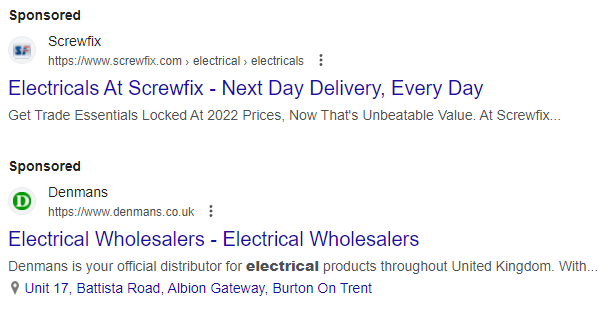If you are new to the SEO industry, you might have seen the term SERPs being mentioned. This abbreviation simply means Search Engine Results Pages, which are seen by online users after they have carried out a keyword search on Google, or any other search engine.
SERPs include organic search results, PPC results, Local listings, featured snippets, and more.
Organic Results
The websites that feature on the first page of organic results within SERPs receive the vast majority of link clicks available. This makes these positions highly desirable and, as a result, extremely competitive. To achieve top rankings on Google, many businesses now implement SEO on their website.
In simple terms, SEO (search engine optimisation) is the process of enhancing your website to improve its online visibility within the search engine results when people have searched for the products and/or services that you provide.
If your website ranks highly for popular, relevant keyword searches, you will attract a higher volume of clicks. This, in turn, leads to more conversions and repeat customers.
There are many great benefits of SEO. It has been proven that websites that achieve first position in Google’s organic results will gain around 32% of all potential clicks. Also, top ranked sites are 10 times more likely to be clicked on than the site found in 10th position.
SEO is one of the most effective online marketing strategies that businesses can adopt. Online users tend to click on organic results as opposed to Google Ad results, due to them being more trustworthy. In most cases, this results in a greater conversion rate being achieved.
PPC Ads
PPC – pay-per-click – is a popular form of online marketing that sees the advertiser paying for every link click they receive. When utilised effectively, the advertising cost of a PPC campaign is trivial because the return far outweighs the spend. For example, if your cost-per-click is £1.00, but you receive £100.00 in sales, you have made a substantial profit.
PPC ads can feature within SERPs in a variety of ways. Firstly, you have the standard Google Ads listings – as shown on the right. These ads are manually created by the advertiser to target search engine users.
Google Ads are a great way to local businesses to gain additional visibility to their desired audience.
Another great option for ecommerce businesses is to promote their services via a Google Shopping campaign.
Google Shopping enables users to run automated ads to promote their products to buyers who have a high intent to buy.
These ads appear within the search results when customers have carried out a search for a specific product. Google shows the most relevant products to the search query. When the ad is clicked, users are taken to the specific product page on the advertisers website.
Google Shopping campaigns are extremely popular within SERPs due to their relevancy. It has been proven that Google Shopping ads provide a higher conversion rate when compared to standard Google Ads. This is due to an increased level of relevancy, whilst the cost and delivery fees are also clearly shown to the potential customer.

Conclusion
SERPs are fundamental to how we use the internet and conduct our online searches. Over the years, search engine results pages have evolved to contain a richer spectrum of options to Google users. We are now given the ability to click on organic results, local results, paid results, images, news articles, and more. This gives the users more choice than ever before, and website owners more online marketing avenues to exploit.
Jump 2 IT Media is a digital marketing agency, specialising in SEO services, PPC management, and Google Shopping ads. We are an award-winning agency that are also Google Partners and Google Ads Certified.





